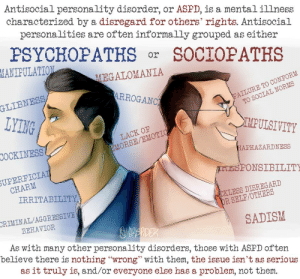What is the Difference Between a Psychopath and a Sociopath?

Often, we call people we are angry with psychopaths or sociopaths. But do these terms mean the same thing?
In common parlance, 'psychopath' and 'sociopath' are often used interchangeably to describe a person who is pathologically prone to criminal or violent behavior, disregards the feelings or interests of others, and feels no remorse or guilt for their crimes. Both conditions are distinguished by several characteristic features, yet they both share many common traits. Therefore, both psychopathy and sociopathy are characterized by a pattern of disregarding and violating the rights of others, manifested by three or more of the following habitual or consistent behaviors:
- Serious violation of criminal laws
- Deceitfulness for personal gain or pleasure, including lying, fraud, or deception
- Impulsivity or failure to plan ahead
- Irritability and aggressiveness, often resulting in physical assaults
- Reckless disregard for the safety of oneself or others
- Inability to fulfill significant adult responsibilities, including work and family duties and financial obligations
- A lack of meaningful remorse or guilt for the serious harm or distress caused to others by one's actions
Other features associated with ASPD (Antisocial Personality Disorder) include a pronounced lack of empathy; a tendency to belittle the rights, interests, or feelings of others; and an excessively high self-assessment, that is, arrogance, conceit, or haughtiness.
Psychologists and psychiatrists emphasize that ASPD, by definition a condition that persists over many years, cannot be accurately diagnosed in children due to the ongoing development of their personalities. However, adults who develop ASPD typically exhibited, as children, a behavioral disorder commonly characterized by aggressive behavior towards people or animals, property damage, deceitfulness or theft, and serious violation of criminal laws or other norms.
Among individuals exhibiting ASPD, those referred to as psychopaths are distinguished by an almost complete inability to form genuine emotional bonds with others:
- A tendency to form superficial and manipulative relationships which the psychopath cynically exploits or uses for personal gain
- The ability to appear glib and even charming to others
- The capability of some psychopaths to maintain a facade of normal work and family life
- A tendency to carefully plan criminal activities to avoid detection.
In contrast, sociopaths often have the ability to develop close attachments to one or a few individuals or groups but also generally experience serious difficulties in forming relationships. Sociopaths are also typically unable to perform anything even remotely resembling a normal work or family life and are much more impulsive and unstable compared to psychopaths, being more prone to anger or violent outbursts. Consequently, their criminal activities tend to be more spontaneous rather than carefully planned.
Although both biological and environmental factors play a role in the development of psychopathy and sociopathy, it is generally accepted that psychopathy is primarily a genetic or hereditary condition, especially related to underdeveloped parts of the brain responsible for emotional regulation and impulse control. The main causes of sociopathy, however, are physical or emotional abuse or serious trauma experienced in childhood. To put it simply, psychopaths are born, and sociopaths are made.
Both psychopathy and sociopathy, as well as ASPD in general, share common traits with Narcissistic Personality Disorder (NPD), often exhibited by individuals referred to as narcissists. Like those with Intermittent Explosive Disorder (IED), narcissists are typically devoid of empathy and tend to have unrealistic high opinions of themselves, and like psychopaths, narcissists are inclined to form shallow relationships, exploit and manipulate others, and appear glib and superficially charming. However, unlike many with ASPD, narcissists are not generally impulsive, aggressive, or habitually deceitful. They characteristically do not show behavioral disorders in childhood or criminal behavior in adulthood. Narcissists also characteristically have a compelling need for admiration, prestige, or envy from others, a trait not seen in those with ASPD.
Thank you for reading
BONUS
Are you a psychopath or a sociopath?
https://www.psychmechanics.com/psychopath-vs-sociopath-test/
















































